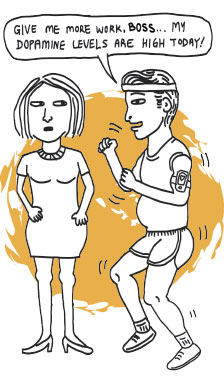Unravelling The Mysteries Of Motivation

Imagine this: You have a major tender report to submit before your year-end performance appraisal, and not one but two policies that you have offered to review. Still, you wish you could do more, if you were not already so stretched.
Meanwhile your perfectly capable colleague does only the minimum at work to get by. He could certainly contribute much more – if only he were motivated.
What makes some people self-starters, who seem like they can do it all, and others needing a push to do more? For the latter, it may not be laziness or a bad attitude, but a matter of brain chemistry.
Motivation in the brain
Dopamine, a neurotransmitter or chemical that transmits signals in nerve cells, has long been associated with reward and pleasure.
More recent findings, however, show that it plays a bigger role in regulating motivation.
According to Dr John Salamone, psychology professor at the University of Connecticut, dopamine is what encourages us to start and persevere towards a goal.
Over 15 years, he studied motivation behaviour by adjusting dopamine levels in rats placed in a cage with two piles of food.
The rats with lower levels of dopamine always chose the easier, unobstructed path to a pile of food. Those with higher dopamine levels, however, would go for the other pile that was twice as large, despite having to first jump over a small fence to reach it.
“Low levels of dopamine make people and other animals less likely to work for things, so it has more to do with motivation and cost-benefit analyses than pleasure itself,” Dr Salamone told his university newspaper after publishing his findings in 2012.

In humans, individuals naturally have different levels of dopamine, which also fluctuate. Too little of the stuff can cause a lack of will to do anything, or worse, lead to depression. On the other hand, too much dopamine could explain why some people pursue – and even get addicted to – harmful behaviour, as they are more compelled to act to seek sensation.
In another 2012 study, researchers at Vanderbilt University found that, during a challenging 20-minute task, dopamine showed up in different areas of the brain for individuals tackling the task differently.
The “go-getters” had more dopamine in parts of the brain known to play important roles in reward and motivation. The brains of “slackers”, however, showed more dopamine in the area of the brain involved in emotion and perceiving risk.

This suggests that dopamine can have different effects when present in different parts of the brain. But there is no data yet to correlate this different behaviour to long-term achievement, explained researcher David Zald – and fortunately, it is possible to retrain the brain.
Different motivation styles
Other than what happens in the brain, people are also motivated by different factors. What works to motivate one person may backfire with another individual.
Motivation can be extrinsic or intrinsic. Extrinsic motivation comes from external rewards, such as money, recognition or praise. Those who respond well to such rewards may be motivated by power and/or achievement, two of the motivational needs identified by Harvard psychology professor David McClelland. Those motivated by power want influence over others, either for personal gain or to advance a group’s collective goals.
Those who are motivated by achievement are results-oriented, seeking challenges and valuing progress as well as feedback. A third motivational need he identified is affiliation. People motivated mainly by affiliation seek teamwork and cooperation with others. (Find out more about McClelland’s three motivators with a quiz.)
Intrinsic motivation arises from within the individual. A sense of purpose and mastery can be powerful means of intrinsic motivation, according to Daniel Pink, author of Drive: The Surprising Truth of What Motivates Us. Another motivator that he believes spurs modern workers is having autonomy and a sense of control over what you do. (Read more in It’s a Tough Job.)
People are also motivated differently in different situations, says motivational speaker and author Tamara Lowe, who spent eight years studying motivation in 10,000 subjects. For example, someone might need variety to thrive in the workplace, but prefer stability at home or at leisure.
In her book, Get Motivated!, she encapsulates motivation in a simple model she calls “Motivational DNA”: drivers, needs and awards. Everyone is to a certain extent driven by a connection with others (affiliation) or production (achievement), has needs for either variety or stability, and is best motivated by intrinsic (e.g., purpose) or extrinsic awards (e.g., money, fame).
TRUE OR FALSE?
Now that you know how motivation works differently in people’s brains, find out whether some commonly held beliefs about what gets people going are true or false.

1. Money is the best motivator for everyone except Millennials, who prefer purpose and autonomy.
It is not just young people who seek more than monetary rewards from work. Studies have shown that for higher-order work, such as those requiring creativity or analysis, too many external rewards can backfire.
A London School of Economics study covering 51 corporate environments found that greater financial incentives can actually lead to a negative impact on overall performance. While bonuses and other financial reward schemes are helpful, they could also have serious negative effects. Increasing financial incentives as an extrinsic reward can turn out to reduce the intrinsic desire to do certain tasks and worsen performance.
Career analyst Daniel Pink has also warned against relying on money as a motivator in the modern workplace. His research finds other benefits, such as recognition, flexible hours and status, to be more motivating than money.
Short answer: Both money and other incentives, such as autonomy, are required – the key is finding the right balance for each employee.
2. Good leaders and bosses will always be able to motivate their staff.
Reward policies from management can help to motivate staff; however, this motivation cannot be created out of nothing. To build a motivated team, leaders must first recruit people who are motivated and then build on or channel that motivation correctly, says Susan Fowler, author of Why Motivating People Doesn’t Work… and What Does. She argues that trying to create, rather than channel, motivation in others never works. That is why recruitment and human resources is so important to the success of an organisation.
Short answer: Yes, but only if you recruit the right people for your team.
3. Motivation can be directly measured.
Motivation, being qualitative, is tricky to observe. Studies tend to discuss motivation in terms of tangible performance, such as productivity. They may also see it as relative by comparing motivation levels over time or towards different goals. These definitions may be useful for tracking and comparing changes, but do not make the quality of personal motivation any clearer to us.
Then there is the Hawthorne effect, which describes the changing of behaviour by subjects of a study due to their awareness of being monitored. In a study at Hawthorne Works, an electrical works factory, certain factors such as the brightness of light were thought to boost workers’ motivation. But further observation showed that it was actually the act of being studied that boosted their motivation, by giving them a sense of significance.
Short answer: False.

4. Inspirational stories are useful for getting motivated.
Does the story of multibillionaire Bill Gates’ success after dropping out of Harvard University inspire you? How about local swimmer Joseph Schooling’s streak of gold medals at the South East Asian Games? Though such stories are always nice to hear, studies have shown that as a motivational tool they do not reliably produce tangible results.
In fact, these tales of triumph can result in a sort of inertia: they work to motivate individuals who are already making a tremendous effort to push on, but have an opposite effect on those who have not yet got going, intimidating and discouraging them instead.
Short answer: It depends on whether you have started on your goal or task.
5. Those wired to be slackers are doomed to underachieve.
Not necessarily. The brain is “plastic”, a term brain scientists use to mean that it is malleable and can learn. Dopamine levels, and hence motivation, also fluctuate all the time. It is possible to train yourself to think and act differently to tap the link between dopamine and motivation – read Methods for more tips.
Short answer: False.
6. Write down your goals for a better shot at success.
In motivational speeches and books, a statistic often bandied about is that the 3% of Yale graduates in the class of 1953 who had set clear, written goals at graduation achieved greater financial success and wealth than all the other 97% graduates combined, 20 years after graduation. However, writers Lawrence Tabak and Paul Morin, who separately went digging for its origins, found no evidence that such a study ever took place.
While this particular example is indeed a myth, it does not mean that techniques of setting specific, measurable and timebound goals are ineffective. Writing down and displaying your goals can be useful as visual reminders, and serve as a way for others around you to hold you accountable.
Short answer: True, but you have to also act on your goals.
3 Ways to Cheer On Your Colleagues
Readers on Cube share their advice.

Treat your colleagues as you would treat customers or yourself
“If staff are having difficulties, are we willing to go the extra mile to help them? … Our [public officers] have set an example for the government service. While [we] do more for our customers, I think that we should do more for [public officers too],” says Jonathan Lim, an engineer at the PUB, Singapore’s national water agency.

Mind your language
Words like chapalang (“a random mix” in Singlish) – “How long do you want to do this chapalang work?” – can affect someone badly, says Ms Nurjasliana Ali from the Municipal Services Office, National Environment Agency.

Care and share
Mr Jackson Yeo is a teacher at Coral Primary School who believes that motivation is important not only for students but for teachers too. He created a Facebook page to share motivational resources with teachers.

For Yourself
Keep your dopamine levels healthy
Taking care of your body also benefits your mental state. Meeting your basic needs for rest, food and fitness will improve your dopamine levels, making you feel better. A “runner’s high”, for example, is due to a spike in dopamine. Dr John Ratey, who wrote Spark: The Revolutionary New Science of Exercise and the Brain, found that exercise raises dopamine levels by promoting the growth of new brain cell receptors.
Consuming nutritious food that contain the amino acid tyrosine, a protein that is a building block of dopamine, will also help. Such foods include cheese, soy, leafy vegetables, beet, avocado, most lean meats – and yes, dark chocolate (which contains tyramine, a similar substance).
Another way to recharge motivation is to be altruistic. Doing kind things, whether it’s sharing a note of thanks or offering to help a colleague with their tasks, benefits both you and the receiver. (Read more in this issue’s Insider’s Take.)
Set incremental goals
The brain can be trained to feed off bursts of dopamine sparked by rewarding experiences, according to neurologist Judy Willis. Breaking a big task down into smaller steps is a way of “rewiring the brain” to attach a dopamine response to the task you want as a reward.
Progressing through a series of goals allows you to experience frequent positive feedback and positive reinforcement, keeping the flow of dopamine going. Interspersing small steps with rewards for achieving them can also help to maintain dopamine levels until you get that whole daunting or dreary task done. (Read more about rewiring your brain.)
Mix up your melodies
The secret behind an inspirational montage in any film is the music. Playing the right music is an easy way to set the mood if you need some motivation.
And if you want to power it up, hit the shuffle button. Randomness and unpredictability in music has been shown to increase dopamine levels and boost mental energy.
Tell stories to yourself as daily reminders
Mr Chua Chin Kiat, Chairman of the Centre for Enabled Living, advises public officers to start their day before work by asking themselves: “What can I do to add value to someone’s life today?” According to him, “the beginning of motivation is the ability to preach to yourself and ask yourself the right questions”, which helps you to always keep the fundamentals firmly in mind. (Read more in Mr Chua's Letter To A Young Public Officer.)
To keep your motivation going all day, and longer if you want, write down your goals on something you can keep on you. Many people have found success with “promise cards” offered by Because I Said I Would, a social movement and non-profit organisation. You can easily print the cards from their site or make your own.
Use your emotions to power through a dip
Humans are emotional, and hence irrational creatures, by nature so rationalising a goal (i.e., “Get the project done early so there will be time for double-checking.”) is not that effective in lighting a fire under us. Anyone feeling a work slump can attest that there is a gap between knowing something has to be done and taking action to get it done.
One way to get motivated quickly is to tap your emotions rather than fight them, says Chip Heath, in his book Switch: How to Change Things When Change Is Hard. For example, if you have just been reprimanded, channel your feelings of disappointment, sadness or anger into spurring motivation (e.g., “I will prove my boss wrong and show quality work!”). Trying to stay fully rational – say, by telling yourself to get over it and get back to focusing on a task – will only cause your negative emotions to intensify, possibly affecting your work.

Use language to change your relationship with a task
According to Neil Fiore, author of The Now Habit, it is not the nature of a task that creates resistance or procrastination, but our relationship with it. He suggests a simple way to change the way we talk to emphasise that we choose to work on a task or project. After all, the things we choose to do, such as our hobbies, rarely cause us to drag our feet. So rather than saying, “I will” or even “I must”, try saying “I choose to…” instead.
For Leaders
Keep tabs on staff morale
At the Ministry of Transport, Permanent Secretary Pang Kin Keong emails his staff periodically and encourages them to take part in the ministry’s half-yearly staff engagement surveys. Each division’s scores are discussed among senior management and at ministry-wide townhall meetings. “That’s my way of encouraging the directors to make sure they really spend a lot of time and attention on human resource... and they know that the greatest deliverable is really leadership and how they motivate their teams,” Mr Pang told Challenge in 2014.
Have a larger narrative
At the Singapore Prison Service (SPS), the “Captains of Lives” concept was introduced to motivate officers to make a difference in inmates’ lives. This created a shift in thinking of prisons as a way to keep offenders behind bars, to a greater focus on rehabilitation and aftercare for inmates. Mr Soh Wai Wah, Commissioner of Prisons, gets his staff to share stories of volunteers’ good work and inmates’ successful rehabilitation on the SPS intranet. Such stories help to encourage Prison staff and prove that the Prison’s programmes do work and inspire others, especially in getting the community to contribute. (Read more in Mr Soh's interview with Challenge)
Quiz: What motivates you best?
David McClelland believed that everyone is motivated by affiliation, achievement and power. Find out which one is your primary motivating need with this quiz designed by Dr Lim Boon Leng from the Centre of Psychological Wellness.
Score 1-5 for each statement if you:
1- Rarely feel or behave this way
5- Always feel or behave this way
- I work well with people.
- I enjoy dealing with difficult challenges at work.
- I believe everyone should keep to schedules and plans.
- I like to share how I feel with my colleagues.
- I set out to be a role model for others.
- I try to exceed the targets set for me at work.
- I always try to be friends with my colleagues.
- I come up with new ideas and suggestions.
- I like to innovate and try new ways to solve problems.
- I know when my colleagues are experiencing difficulties and will respond to them.
- It is important for me to put across my point in any discussion.
- I seek feedback from colleagues to understand how I can improve.
- Status symbols, such as the size of my office, are important to me.
- I work well under the pressure of deadlines.
- I am concerned about the personal lives of my colleagues.
Styles
- Achievement: Add up the points for statements 2, 6, 9, 12, 14
- Affiliation: Add up the points for statements 1, 4, 7, 10, 15
- Power: Add up the points for statements 3, 5, 8, 11, 13
The style for which you score highest is your predominant motivational style.
Achievement
You like to set targets and have a strong need to achieve them. You like challenges at work and will take calculated risks in completing your tasks. You are open to regular feedback so you can improve your performance. However, you prefer to work alone or get things done by yourself.
Affiliation
You want to be liked by your fellow colleagues and want to belong in a group. You prefer to cooperate rather than to compete with your colleagues. You often go along with what the rest of the group decides on and may be averse to high risk and uncertainty.
Power
You want to influence others and are conscious of status and recognition at work. You enjoy competition and like to win. You have a need to be heard and to win arguments. This motivator can be divided into personal and institutional power. People with an institutional power drive like to influence teams to further an organisation’s goals, whereas those with a personal power drive want to have control over others – and may not be good team members.
- POSTED ON
Nov 9, 2015
- TEXT BY
Siti Maziah Masramli
Chia Soong Ming
- PHOTOS BY
Charles Chua
- ILLUSTRATION BY
Mushroomhead
-
Deep Dive
Strengthening Singapore’s Food Security
-
Work Better
Slice Up Your Tasks To Beat Procrastination









